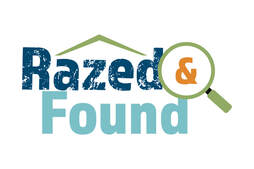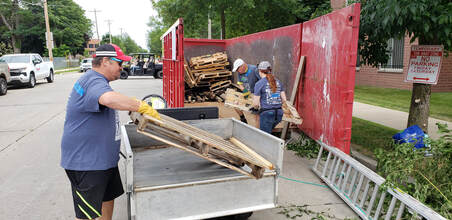Block build MKE Diversion
in partnership with revitalize mkE
|
We were honored to launch a pilot program with Revitalize Milwaukee and so many wonderful volunteers to divert waste from the landfill at this year's Block Build MKE! In one weekend, the community came together to perform nearly 1,000 repairs in 23 homes of low-income veterans, seniors, and people with disabilities.
|
|
This year, with the help of a great team, we worked to recycle 3.8 TONS of metal and wood with no contamination. Materials recycled mean more than waste diverted from landfills; with a 13% recycling rate for the entire event, about 1 acre of habitat and 60 trees were saved. A huge thank you to everyone who helped keep our neighborhoods strong, our communities greener, and our environment cleaner for all!
|
Razed & Found
wastecap architectural salvage and resuse warehouse

Opened in 2015, Razed & Found, originally referred to as WasteCap Architectural Salvage and Reuse Warehouse, was a division of WasteCap Resource Solutions. Its primary mission is to preserve Milwaukee's rich architectural history by turning what would normally be seen as waste, into cherished resources. Razed & Found offered deconstruction services, hosted do-it-yourself workshops, and operated a retail store that sold salvaged materials. Razed & Found was closed in 2019.
From Drywall to Soil
WasteCap's Study on the benefits of reusing gypsum in agriculture
In 2001, WasteCap provided waste management services during the construction of Alliant Energy Corporation's headquarters in Madison. Part of the project involved finding a recycling market for its drywall scrap.
With the support of a Solid Waste Managment Assistance Grant from the U.S. Environmental Protection Agency, WasteCap collected more than 60 tons of scrap drywall from commercial and residential sites, ground it, screened it and delivered it to the Royster-Clark plant, which made high-grade commercial fertilizer from it.
Ultimately, this project aimed to create a permanent, self-sustaining market for scrap drywall in the Madison market. In October 2024, the Wisconsin Department of Natural Resources approved a low-hazard grant of exemption that allowed builders and contractors to store, process and land-spread waste gypsum wallboard as a soil amendment, bringing this goal to fruition across the state.
With the support of a Solid Waste Managment Assistance Grant from the U.S. Environmental Protection Agency, WasteCap collected more than 60 tons of scrap drywall from commercial and residential sites, ground it, screened it and delivered it to the Royster-Clark plant, which made high-grade commercial fertilizer from it.
Ultimately, this project aimed to create a permanent, self-sustaining market for scrap drywall in the Madison market. In October 2024, the Wisconsin Department of Natural Resources approved a low-hazard grant of exemption that allowed builders and contractors to store, process and land-spread waste gypsum wallboard as a soil amendment, bringing this goal to fruition across the state.
From Landfill to land
Wastecap's business food waste pilot program
With funding from the Recycling Market Development Board and the Greater Milwaukee Foundation, WasteCap coordinated a business food waste diversion pilot program from 2000-2002. The project aimed to reduce food waste in the hospitality and grocery sectors and develop the market for food waste in Wisconsin.
As part of the pilot, Best Disposal Inc. collected food discarded by grocery store produce departments, including Outpost Foods, BKT Sentry Foods-Meadowbrook, Jewel Osco, and Kohl's Food Emporium. The scraps were then mixed with other food scraps and yard debris for decomposition at S&R Compost facility to compost and later marketed to landscapers and municipalities. In the program's first seven weeks, 70,660 pounds of food waste were diverted for composting.
As part of the pilot, Best Disposal Inc. collected food discarded by grocery store produce departments, including Outpost Foods, BKT Sentry Foods-Meadowbrook, Jewel Osco, and Kohl's Food Emporium. The scraps were then mixed with other food scraps and yard debris for decomposition at S&R Compost facility to compost and later marketed to landscapers and municipalities. In the program's first seven weeks, 70,660 pounds of food waste were diverted for composting.



